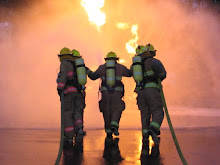Tuesday, January 5, 2010
Epistemic Dissonance
An oversimplified piece of my story is that I left the fire service and eventually wound up coming to D.C. to study theology and international relations/peace and conflict because, I’d always say, “It seems like faith is often involved in conflict.” It is high time to trash this foggy rationale. It is quite naïve to not overhaul the conflations that smolder in the walls of my thinking. If I start removing the generalizations—blowing the smoke out, you might say—I have to come to terms and be accountable for what I find underneath. People could be trapped here in a variety of ways—me too! Let’s put a fan at the door while we begin feeling around for a wall to help us. Ah, here’s one:
1. Faith is involved in everything. If faith is what I believe, somehow this has got to reconcile with what I know and what I do. Or not. This "or not" is the goofy gap that I tend to pass over when I don’t carefully watching my step and when I don't keep in mind that what I do is actually what I believe. I can talk, talk, talk about believing this and that, but what I do demonstrates what I know. If there is a gap between a person’s (or a people’s) knowing and doing, couldn’t we call it cognitive or even epistemic dissonance?
2. The gap, no matter what I call it, must be wrestled with and not left up in the air when I use phrases like “I have faith in Jesus” or “I am saved by faith.” Think of how these meanings call us to think through what they mean. These are only two of the thousands of ways I have used the word “faith,” and I already see that there are things I am saying about who Jesus is, about what salvation is, and about my participation in reality as I know it. How often am I saying those things and just as quickly—just by not staying diligent and deliberate—losing my way in the gap?
3. I’ll hold and come back to the all important question of when “I” becomes “we” for all of this conversation, and who the heck are we talking about when we say "we”?
It is enough for me today—maybe enough smoke to deal with in one round—to think through the conflict of faith, much less international epistemic dissonance.
Mike C.
1. Faith is involved in everything. If faith is what I believe, somehow this has got to reconcile with what I know and what I do. Or not. This "or not" is the goofy gap that I tend to pass over when I don’t carefully watching my step and when I don't keep in mind that what I do is actually what I believe. I can talk, talk, talk about believing this and that, but what I do demonstrates what I know. If there is a gap between a person’s (or a people’s) knowing and doing, couldn’t we call it cognitive or even epistemic dissonance?
2. The gap, no matter what I call it, must be wrestled with and not left up in the air when I use phrases like “I have faith in Jesus” or “I am saved by faith.” Think of how these meanings call us to think through what they mean. These are only two of the thousands of ways I have used the word “faith,” and I already see that there are things I am saying about who Jesus is, about what salvation is, and about my participation in reality as I know it. How often am I saying those things and just as quickly—just by not staying diligent and deliberate—losing my way in the gap?
3. I’ll hold and come back to the all important question of when “I” becomes “we” for all of this conversation, and who the heck are we talking about when we say "we”?
It is enough for me today—maybe enough smoke to deal with in one round—to think through the conflict of faith, much less international epistemic dissonance.
Mike C.
Subscribe to:
Post Comments (Atom)


No comments:
Post a Comment